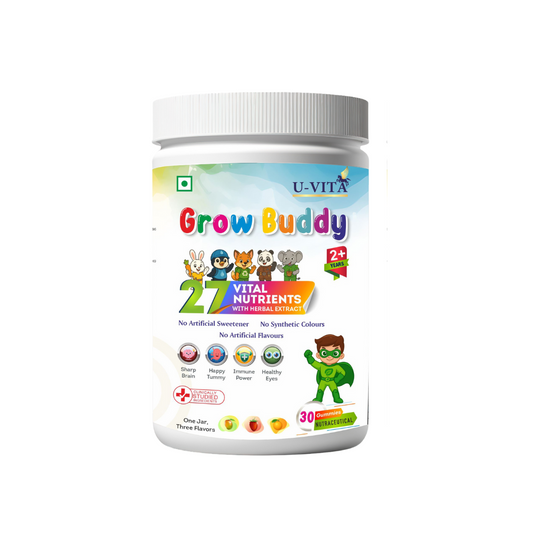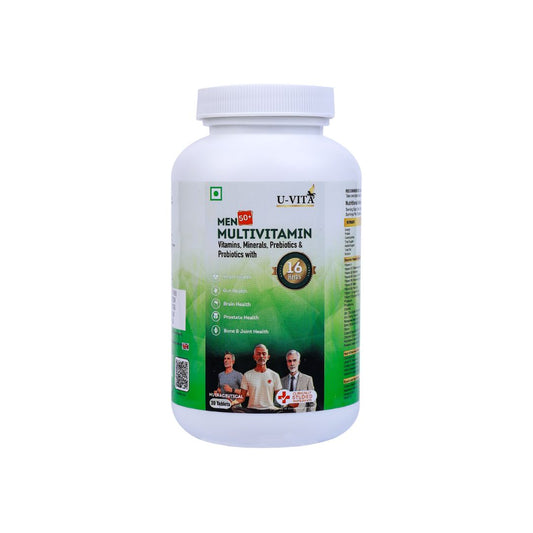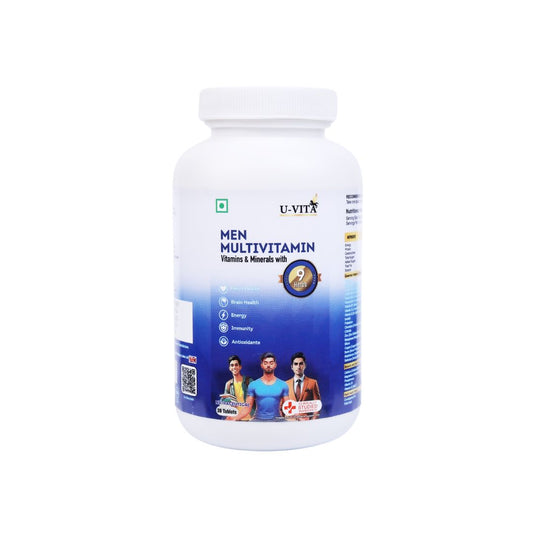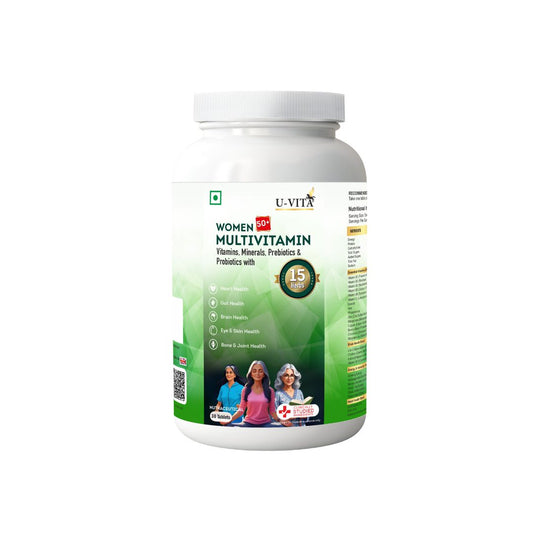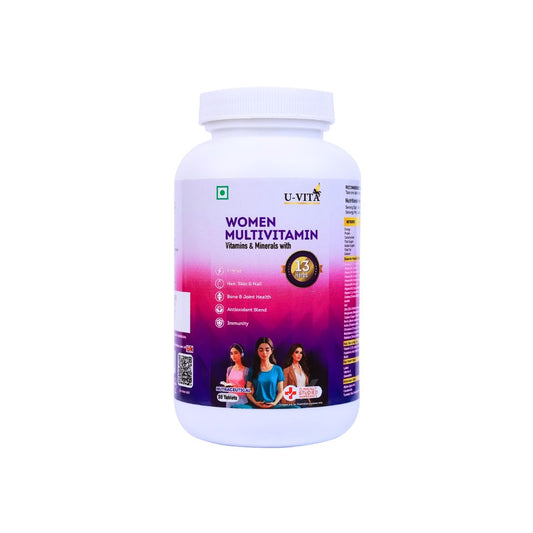Long working hours, processed foods, and hectic schedules often make it difficult to get all the nutrients our bodies need from meals alone. That’s where multivitamins come in. The small but mighty supplements fill the nutritional gaps easily.
Multivitamins are not a replacement for healthy eating, but they help your body to get what it needs to stay active and strong. With so many types of multivitamins in the market, choosing the best one feels overwhelming, right?
But no worries! This guide helps you understand how to choose the best multivitamin for your lifestyle and body needs. Let’s go.
What are Multivitamins?

Multivitamins are supplements that combine essential vitamins and minerals in one convenient dose or a pill. They are designed to support your overall health by providing nutrients you might not get enough of from your daily diet.
Typically, a good multivitamin includes vitamins A, C, D, E, and K, along with several B-complex vitamins like B1, B2, B6, B12, and folic acid. Most also contain key minerals such as calcium, magnesium, iron, zinc, selenium, and more.
Why Should One Take Multivitamins?
Multivitamins help to fill the nutritional gaps for your overall health and wellbeing. However, Harvard Medical School advises that they should complement, not replace, a balanced diet.
1. Fills Nutritional Gaps
We often don’t get all the essential nutrients we need from food alone. Thus, multivitamins ensure your body gets all the nutrients missing from your daily meals.
2. Boosts Immunity
Vitamins like C, D, and minerals such as zinc are essential in strengthening your immune system. They help your body ward off infections and recover faster when you’re feeling under the weather.
3. Increase Energy Levels
B-vitamins are essential for converting the food you eat into energy. With the right multivitamin, you can combat fatigue and stay focused throughout the day with more energy.
4. Supports Bone and Muscle Health
Vitamin D, calcium, and magnesium are vital for strong bones and muscles. As we age, we need more of these nutrients to maintain mobility and prevent joint pain.
5. Promotes Healthy Skin, Hair, and Nails
Biotin, vitamin E, and antioxidants support your skin, nails, and hair. Taking the right multivitamin can help you maintain that healthy glow and keep your hair and nails strong.
6. Prevents Common Nutritional Deficiencies
Many people suffer from deficiencies in vitamin D, B12, iron, and calcium. Multivitamins are a convenient way to help prevent these common gaps. It ensures you feel your best and avoid fatigue, weakness, or bone problems.
How to Choose Multivitamins?

Picking the right multivitamin is not about choosing the one with the most nutrients listed on the label. It’s about finding the one that best fits your personal requirements. Here are some factors to keep in mind while you choose a multivitamin for men or women.
1. Age Matters
Our nutritional needs change as we age. Children require nutrients that support growth and brain development, while adults may need more vitamins to support metabolism and energy. Seniors often benefit from extra vitamin D and calcium for bone and joint health, along with B12 for brain and nerve function.
2. Gender Differences
Men and women have different nutritional requirements. Women often need more iron due to menstruation, while men might require higher levels of zinc and magnesium to support muscle health and hormone balance. On the other hand, prenatal multivitamins are designed specifically for pregnant women, containing folic acid, iron, and DHA to support foetal development.
3. Lifestyle Factors
Your daily routine influences your nutri
tional needs. If you’re physically active or play sports, look for a multivitamin that supports muscle recovery, hydration, and energy metabolism. If you have a sedentary job, choose one that improves immunity, metabolism, and focus. Frequent travellers might opt for formulas with added antioxidants to combat fatigue and stress.
4. Health Conditions
Certain health conditions increase nutrient requirements. For instance, people with diabetes may benefit from supplements with chromium and alpha-lipoic acid to help manage blood sugar, while those with thyroid disorders should look for iodine and selenium. Always consult a healthcare professional before selecting a product suitable for your medical condition.
5. Quality Counts
Not all supplements are created equal. Look for brands that are transparent about their ingredients, use clean manufacturing practices, and are backed by certifications like GMP (Good Manufacturing Practice), ISO, HACCP, etc.
Multivitamin Buying Tips: What to Look For?
When shopping for multivitamins, a little awareness goes a long way. Here are some practical tips to help you choose wisely.
-
Read the Ingredients List Carefully
Check the label for essential vitamins and minerals that match your needs. Avoid products with excessive additives, artificial colours, or sweeteners. Natural extracts or plant-based formulas are often a better choice.
-
Dosage Accuracy
The best multivitamin should align with your recommended daily allowances (RDA). Extremely high doses of certain nutrients can cause side effects. Hence, stick to balanced formulations unless your doctor recommends otherwise.
-
Certifications and Testing
Always choose supplements that are certified by recognised health authorities or laboratories. Labels such as FDA, ISO, or GMP ensure that the product meets safety and quality standards.
-
Beware of Unrealistic Promises
If a product claims to “cure diseases,” or “make you look younger overnight,” it’s likely too good to be true. Multivitamins are not magic pills; they work gradually to support your overall well-being.
-
Consult Healthcare Experts
Before starting any supplement, especially if you’re on medication or have chronic health issues, talk to your doctor or a registered nutritionist. They can help you choose the right formulation and dosage based on your health profile.
Understand the Difference for Multivitamin Selection
|
Feature |
Standard Market Multivitamins |
Premium Multivitamins like U-Vita |
|
Ingredient Quality |
Basic synthetic vitamins and minerals |
Clinically-studied, plant-based, bioavailable nutrients |
|
Sourcing |
Generic bulk suppliers, limited transparency |
Traceable ingredients, sustainably sourced, often herb-based |
|
Certifications |
May have minimal or local certifications (e.g., FSSAI only) |
Have global certifications like ISO, HACCP, FDA, GMP, etc. |
|
Additives/Fillers |
May contain artificial colours, preservatives, sugar |
Minimal or no additives; focus on purity and safety |
|
Transparency |
Limited ingredient and process information |
Full disclosure of ingredient origins, lab testing, process transparency |
|
Formulation |
General, “one-size-fits-all” blends |
Customised for age, gender, and lifestyle requirements |
|
Consumer Benefit |
Meets basic nutrition needs |
Improved wellness, absorption, and safety outcomes |
To Sum Up
There is no single “best” multivitamin that fits everyone. The right choice depends on your age, gender, diet, and daily lifestyle. What works for one person might not suit another, and that’s completely normal.
U-Vita offers multivitamin supplements for women and men to meet your specific needs, ensuring optimal health every day. With us, you can trust that your body is getting the right nutrients it needs to thrive, naturally.
So, make smart choices with multivitamins today for a healthier tomorrow!
FAQs
How do I know what vitamins I need?
Consult a healthcare professional who can assess your diet, health, and any deficiencies to recommend the right vitamins.
How do you know if a multivitamin is high quality?
Check for certifications like FDA, ISO, or GMP, and choose brands that provide transparent ingredient information.
Do multivitamins have side effects?
In general, if taken as directed, multivitamins are safe, but excessive intake can cause side effects or interactions.
Is it good to take a multivitamin every day?
Yes, when necessary and under guidance, daily multivitamins can help maintain nutrient balance and overall health.
What is the best time to take multivitamins?
The best time is usually with a meal, either in the morning or the afternoon, to improve absorption and reduce stomach discomfort.

